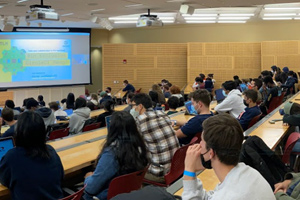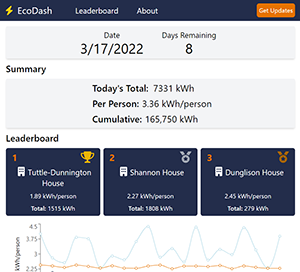App wins sustainable IT prize
May 13, 2022
The winning HooHacks application tracks energy use in real-time

During the HooHacks annual event, a group of UVA students developed an application using Facilities Management's building metrics for students to view real-time energy usage among the different dorms.
The application, EcoDash, was inspired by the Office for Sustainability's annual Dorm Energy Race, where dorms compete to use the least amount of energy in a one-month span. The team — including UVA students Adriel Kim, Oliver Song and Jules Le Menestrel — aimed to “gamify” the competition and encourage student awareness and engagement.
“Ultimately, EcoDash aims to encourage students to be more energy-efficient and teach everyone that sustainability can be both productive and fun,” wrote the team, which received first place and a $500 prize for the best sustainability project.
During the March 26-27 event, students had 24 hours to create a software or hardware project (such as a web or mobile application) from scratch. The event — which included more than 1,200 participants with 97 projects during the event — is considered the largest hackathon in Virginia and among the 50 largest in the country.
Teams competed for prizes in numerous categories, including sustainability. Director of Technology & Innovation Chris Smeds serves as co-chair of the University's Sustainable IT Working Group, which sponsored the prizes for the best sustainability application, and served as a judge at the hackathon. The second-place prize application, StreetSweep, helps curb littering by analyzing images found all over the Internet for instances of garbage.

StreetSweep uses computer vision and machine learning to give governments and volunteer organizations access to information about the amount and types of littering in locations around the world. The app is designed to detect garbage in any crowd-sourced geotagged photo so that anyone can visit the website and see a public board of where trash is located in their area.
The StreetSweep team — including UVA students Michael Fatemi and Suhas Nandiraju — received a $250 second-place prize.
Check out all of the HooHacks 2022 projects.
Jane Centofante
Communications senior generalist
UVA Facilities Management
(434) 982-5846
janecentofante@virginia.edu